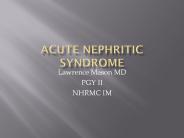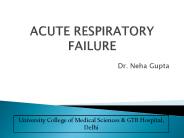Severe Acute Respiratory Syndrome Symptoms PowerPoint PPT Presentations
All Time
Recommended
Physiologicoanatomical peculiarities of the respiratory system The peculiarities of sinuses in children The peculiarities of the pharynx at the ... Heimlich maneuver.
| PowerPoint PPT presentation | free to view
Title: Severe Acute Respiratory Syndrome Author: Only Last modified by: Only Created Date: 3/24/2003 5:49:26 AM Document presentation format:
| PowerPoint PPT presentation | free to view
Severe Acute Respiratory Syndrome (SARS) AA Model for Preparedness for Emerging Diseases Finding and Filling Gaps What is the status of Big Gaps Clinical ...
| PowerPoint PPT presentation | free to view
... etc. Dry, nonproductive cough after 2 to 7 days. ... Wedding During the Outbreak. Beijing: Panic. New Government and New Approach after April 20, 2003 ...
| PowerPoint PPT presentation | free to download
SARS is a respiratory illness that is caused by a corona virus called SARS-associated corona virus (SARS-CoV). Corona viruses are a common cause of upper respiratory illnesses - including the common cold - in humans and cause a number of diseases in animals.
| PowerPoint PPT presentation | free to download
SARS is a respiratory illness that is caused by a corona virus called SARS-associated corona virus (SARS-CoV). Corona viruses are a common cause of upper respiratory illnesses - including the common cold - in humans and cause a number of diseases in animals.
| PowerPoint PPT presentation | free to download
Severe Acute Respiratory Syndrome SARS
| PowerPoint PPT presentation | free to download
Severe Acute Respiratory Syndrome (SARS) David S. Stephens MD
| PowerPoint PPT presentation | free to view
SARS, an atypical pneumonia of unknown etiology, was recognized at the end of February 2003 ... of lung infiltrates consistent with pneumonia or RDS or autopsy ...
| PowerPoint PPT presentation | free to view
Contact precautions (gloves, long sleeve gown and eyewear) Droplet precautions ... Gown, gloves and eyewear. GRICG May 2003. Possible SARS Exposures ...
| PowerPoint PPT presentation | free to view
G L O B A L P A R T N E R S H I P. I N T E R N A T I O N A L H E A L T H R ... First described ... Rapid nosocomial transmission. Burden on health care systems ...
| PowerPoint PPT presentation | free to view
day 6 or 7. Clinical Picture. Onset / Presentation. Click to edit Master text styles ... Require ICU admission & mechanical ventilation. Case fatality rate: ~ 6 ...
| PowerPoint PPT presentation | free to view
http://newsvote.bbc.co.uk/mpapps/pagetools/print/new.bbc.co.uk/1/hi/health/ 2867055.stm ... http://cnn.health.printhis.clickability.com/pt/cpt?action=cpt&expire ...
| PowerPoint PPT presentation | free to download
Acute Respiratory Insufficiency Acute Respiratory Failure (ARF) Dr.Judit M ray Institute of Anesthesiology and Intensive Therapy Acute respiratory failure The goal ...
| PowerPoint PPT presentation | free to view
muscle aches or breathing problems or dry cough. and: traveled to China, Hong Kong, Toronto (Canada), Vietnam ('affected areas' ...
| PowerPoint PPT presentation | free to view
Outbreak of Severe Acute Respiratory Syndrome (SARS) in Hong Kong The Hong Kong Medical Association
| PowerPoint PPT presentation | free to view
Outbreak of Severe Acute Respiratory Syndrome (SARS) in Hong Kong The Hong Kong Medical Association Types of Pneumonia Bacterial Pneumonia Atypical Pneumonia ...
| PowerPoint PPT presentation | free to view
Severe Acute Respiratory Syndrome (SARS) Interim Australian Infection Control Guidelines Guidelines released by Commonwealth Department of Health and Aging
| PowerPoint PPT presentation | free to view
Principles of Patient Management Severe Acute Respiratory Syndrome (SARS) WHO Western Pacific Regional Office April 17, 2003
| PowerPoint PPT presentation | free to view
Severe Acute Respiratory Syndrome (SARS): Basics Update May 8, 2003 Rashid A. Chotani, MD, MPH Assistant Professor, School of Medicine, School of Public Health ...
| PowerPoint PPT presentation | free to download
New reports of outbreaks came in from Hong Kong, Singapore & Vietnam ... Highly probable: origination is a cross-species jump from civet cat to human ...
| PowerPoint PPT presentation | free to view
... Azra C., Donnelly, Christi A., Riley, Steven, Ferguson , Neil M., Leung, Gabriel ... T.F., Tsui, Hiyi, Lau, Mason, and Yang, Xilin (2004) SARS Transmission, ...
| PowerPoint PPT presentation | free to download
... may have affected birds and mammals (BBC, Aug 2003) Viral Origin in animals ... Health care workers can reduce their chances of catching SARS because they do ...
| PowerPoint PPT presentation | free to view
CIVET CAT. Nocturnal Animal. Related To Mongoose. Delicacy in Southern China. NY Times 4/27/03 ... Animal reservoir, civets other animals? Diagnosis. Confirmed Case ...
| PowerPoint PPT presentation | free to view
SEVERE ACUTE RESPIRATORY SYNDROME (SARS) Quek Boon Har UMMC What are the signs and symptoms of SARS ? begins generally with a prodrome of fever ( 38 oC), chills ...
| PowerPoint PPT presentation | free to download
Hong Kong resident was admitted to Prince of Wales Hospital, setting out a huge outbreak ... Hong Kong doctors yesterday produced reassuring news for parents ...
| PowerPoint PPT presentation | free to view
sputum aspirates NP/OP washes NP/OP swabs. more sample. multiple samples. Others specimens ... (sputum, nasal aspirate/wash, np/op swabs) Blood ...
| PowerPoint PPT presentation | free to view
WHO Western Pacific Regional Office. April 17, 2003. 2. Patient Management ... Staff must wear full personal protective equipment (PPE) ...
| PowerPoint PPT presentation | free to view
Severe Acute Respiratory Syndrome in Hong Kong Department of Health Hong Kong SAR (as at 10 April 2003) Background Background The World Health Organization has ...
| PowerPoint PPT presentation | free to download
Michael Leonard What is SARS? A viral respiratory illness caused by a coronavirus, called SARS-associated coronavirus (SARS-CoV) Single-stranded RNA First developed ...
| PowerPoint PPT presentation | free to download
1st case: person visits Hong Kong (February 20-25, 2003) and develops dry cough ... Facts and Figures ... Basic Information About SARS. http://www.cdc.gov ...
| PowerPoint PPT presentation | free to view
Bats may be persistently infected with many viruses but rarely display ... species from the genus Rhinolophus (horseshoe bats) demonstrated a high SARS-CoV ...
| PowerPoint PPT presentation | free to download
Severe Acute Respiratory Syndrome (SARS) and Preparedness for Biological Emergencies 27 April 2004 Jeffrey S. Duchin, M.D. Chief, Communicable Disease Control ...
| PowerPoint PPT presentation | free to download
JOSE B. LINGAD MEMO. GENERAL HOSPITAL. CABANATUAN, NUEVA ECIJA. DR. ... JOSE RIZAL MEMORIAL HOSPITAL. MARGOSATUBIG, ZAM. DEL SUR. MARGOSATUBIG REGIONAL HOSPITAL ...
| PowerPoint PPT presentation | free to view
WHO COMMUNICABLE DISEASES SARS, 15 June 2003. 1 ... Official report of 48-year-old business man with high fever ( 38 C), atypical ...
| PowerPoint PPT presentation | free to download
Severe Acute Respiratory Syndrome (SARS): Global Alert, Global Response ... Infectious disease outbreaks reveal weaknesses in public health infrastructure ...
| PowerPoint PPT presentation | free to download
JOSE B. LINGAD MEMO. GENERAL HOSPITAL. CABANATUAN, NUEVA ECIJA. DR. ... JOSE RIZAL MEMORIAL HOSPITAL. MARGOSATUBIG, ZAM. DEL SUR. MARGOSATUBIG REGIONAL HOSPITAL ...
| PowerPoint PPT presentation | free to view
First recognised in Feb 2003 (case in Hanoi) A form of Atypical Pneumonia ... Cases confirmed NOT SARS after serology tests: 9. Cases in hospital: 42 ...
| PowerPoint PPT presentation | free to view
There have been reports of 'SARS' from different parts of the world since ... After handling nappies, faeces or articles soiled with respiratory secretions; ...
| PowerPoint PPT presentation | free to download
Severe Acute Respiratory Syndrome (SARS) and Preparedness for ... Adenovirus. Influenza. Mumps. Rubella. Parvovirus B19. Pneumonic plague. Smallpox. SARS ...
| PowerPoint PPT presentation | free to download
Tracking diagnostic laboratory test results ... Cooperate with public health authorities during investigations of cases and ... Radiographic evidence of ...
| PowerPoint PPT presentation | free to download
Onset of fever, chills/rigors, headache, myalgias, malaise ... Sore Throat. 25* 68. 75. 96. Coronavirus Negative (n=28) % 67. Diarrhea. 83. Chills/Rigor ...
| PowerPoint PPT presentation | free to view
SARS is a new illness caused by a new virus called the SARS virus. ... can only go back to school when they have been afebrile (no fever) for 2 days ...
| PowerPoint PPT presentation | free to view
Severe Acute Respiratory Syndrome (SARS) and Preparedness for Biological Emergencies ... thickening of the intra-lobular or interlobular interstitium /- consolidation ...
| PowerPoint PPT presentation | free to download
Review key epidemiologic features of SARS ... Infiltrates develop on chest radiograph in nearly 100% of laboratory confirmed cases ...
| PowerPoint PPT presentation | free to view
Acute Respiratory Distress Syndrome, Fat Embolism,
| PowerPoint PPT presentation | free to view
Main symptom of ischemic heart disease is chest pain ... acute coronary ischemia. inflammatory heart disease. cardiomyopathies. circulatory failure & shock ...
| PowerPoint PPT presentation | free to view
Brachial plexus neuropathy syndrome, also termed as brachial plexopathy, is a nerve disorder in the brachial plexus, a bundle of nerves from the spinal cord that separates in to individual shoulder and arm nerves.
| PowerPoint PPT presentation | free to download
Brachial plexus neuropathy syndrome, also termed as brachial plexopathy, is a nerve disorder in the brachial plexus, a bundle of nerves from the spinal cord that separates in to individual shoulder and arm nerves.
| PowerPoint PPT presentation | free to download
http://www.detnews.com/2003/health/0304/03/03/e01-126809.html. http://www.health.ri.gov/disease ... http://www.cnn.com/2003/HEALTH/04/04/sars.bush/index.html ...
| PowerPoint PPT presentation | free to view
Lawrence Mason MD PGY II NHRMC IM * * * * * * * * * * * * * * * * * * * * * * * * * * * * * * * * * * * * * * * * * * * * * * * * * * * * * * * * * * * Prognosis at ...
| PowerPoint PPT presentation | free to download
Chest pain suggestive of ischemia. 12 lead ECG. Obtain initial cardiac enzymes ... Chest or left arm pain or discomfort as chief symptom ...
| PowerPoint PPT presentation | free to view
Acute Radiation Syndrome Acute Radiation Syndrome (ARS) ARS, or radiation sickness, occurs in humans after whole-body reception of large doses of ionizing radiation ...
| PowerPoint PPT presentation | free to view
... or bradypnea ALI & ARDS Severe cardiogenic shock Traumatic brain injury Brain injury Indications for Invasive Mechanical Ventilation ... principles of internal ...
| PowerPoint PPT presentation | free to download
SYNERGY in patients with a non-ST elevation ACS who receive a GP IIb/IIIa inhibitor and undergo PCI, ... level C depends direct thrombin inhibitor bleeding d/o, ...
| PowerPoint PPT presentation | free to download
Respiratory Distress Syndrome PREPARED BY: Dr. SALEH BANAT Moderator : Dr. Y. ABU OSBA Pathophysiology RDS is caused by: A relative deficiency of surfactant.
| PowerPoint PPT presentation | free to view
























































